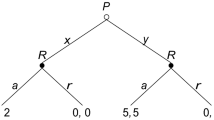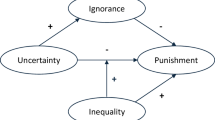Abstract
“Si él lo necesita” (if he really needs it) was the most common argument given by the subjects who accepted the zero offer in the ultimatum game (strategy method) during experiments conducted among illiterate (adult) gypsies in Vallecas, Madrid. Interestingly the acceptance of the zero offer was not a rare case but, in contrast, was the modal value. This is even more remarkable if we consider that the 97% of the subjects proposed the equal split.
Similar content being viewed by others
References
Bahry, D. L., & Wilson, R. K. Confusion or fairness in the field? Rejections in the ultimatum game under the strategy method. Journal of Economic Behavior & Organization (forthcoming)
Barth, F. (1969). Ethnic groups and boundaries: the social organization of culture difference. Boston: Little Brown
Bateson, D., & Shaw L. (1991). Evidence of altruism: toward a Pluralism of Prosocial Motives. Psychological Inquiry, 2, 107—122
Bolton, G. E., & Ockenfels, A. (2000). ERC: A theory of Equity, Reciprocity and Competition. American Economic Review, 90, 166—193
Brańas-Garza, P. (2006). Poverty in Dictator Games: awakening solidarity. Journal of Economic Behavior & Organization, 60(3), 306—320
Díez—Nicolás, J. (1998). Informe ASEP, Ministerio de Trabajo y Asuntos Sociales (IMSERSO): Madrid
Camerer C. (2002). Behavioral Game Theory: Experiments on Strategic Interaction. Princeton University Press
Charness, G., & Rabin, M. (2002). Understanding social preferences with simple tests. Quarterly Journal of Economics, 117, 817—869
Cobo-Reyes, R., & Jiménez, N. (2006). Inequality aversion among gypsies: a field investigation. The papers 06/06, Universidad de Granada
Fehr, E. & Schmidt, K. M. (1999). A theory of Fairness, Competition and Cooperation. The Quarterly Journal of Economics, 114, 817—868
Ferraro, P., & Cummings, R. (2005). Experimental approaches to understanding conflict over natural resources. Water Policy Working Paper, 016
Gamella, J. (2002). Exclusion social y conflicto étnico en Andalucía. Gazeta de antropología, 18
Gay Blasco, P. (1999). Gitanos of Madrid. Oxford, Berg
Guth, W., Huck, S., & Muller, W. (2001). The relevance of equal splits in ultimatum games. Games and Economic Behavior, 37, 161—169
Henrich, J., & Esminger, J. (2002-2005). The Roots of Human sociality: An ethno-experimental exploration of the foundation of economic norms. Project of the California Institute of Technology, division of the humanities and social sciences
Henrich J. (2000). Does Culture matters in Economics Behaviors: Ultimatum Game Bargaining among Machiguenga. American Economic Review, 90, 973—980
Henrich, J., Boyd, R. Bowles, S., Camerer, C., Gintis, H., McElreath, R., & Fehr, E. (2001). In search of homo economicus: Experiments in 15 small-scale societies. American Economic Review, 91, 73—79
Lancy, D. (1996). Playing on Mother Ground: Cultural Routines for Children’s Development. London: The Guildford Press
Martin, E., & Gamella, J. (2005). Marriage practices and ethnic differentiation: The case of Spanish gypsies (1870-2000). The history of the family, 10, 45—63
Rabin, M. (1993). Incorporating fairness into game theory. American Economic Review 83, 1281—1302
Rabin, M. (1998). Psychology and economics. Journal of Economics Literature XXXVI, 11—46
Ringold, D., Orenstein, M., & Wilkens, E. (2000). Roma in an expanding Europe: breaking the poverty cycle. World Bank Studies
Author information
Authors and Affiliations
Corresponding author
Additional information
JEL Classification D63 · D64 · C93 · J15
Electronic supplementary material
Rights and permissions
About this article
Cite this article
Brañas-Garza, P., Cobo-Reyes, R. & Domínguez, A. “Si él lo necesita”: Gypsy fairness in Vallecas. Exp Econ 9, 253–264 (2006). https://doi.org/10.1007/s10683-006-9126-0
Received:
Revised:
Accepted:
Issue Date:
DOI: https://doi.org/10.1007/s10683-006-9126-0




